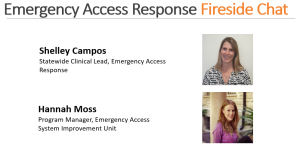In May 2022 the Premier of WA launched a package of reforms to improve emergency care in WA. This included setting up a Ministerial Taskforce on this issue, led by the Minister for Health. (Read more about that announcement here: https://www.mediastatements.wa.gov.au/Pages/McGowan/2022/05/New-252-million-dollar-reform-package-to-improve-WA-emergency-care.aspx)
HCC has been funded by the WA Department of Health to establish a consumer/carer/community/lived experience network of people with an interest in relevant areas to this program.
Click here to sign up to this consumer, carer, community, lived experience network to receive regular updates about this work, including opportunities to be involved
Clare Mullen, HCC’s Deputy Director is a member of the Program Control Group.
Areas of focus
This program is very wide-reaching. It’s about how people arrive at, move through, and move out of a hospital setting. It is looking at a range of options including identifying clinically appropriate alternative treatment options as people enter the health service – meaning people who don’t need emergency treatment don’t have to wait unnecessarily in an ED waiting room, or in an ambulance outside the hospital. It could also include supporting timely discharge from hospital to other appropriate services when someone no longer needs specialist medical treatment.
It covers how someone might end up at an Emergency Department (ED), how they move from the ED to a ward (or leave the ED to go home), and how they get discharged from the hospital eventually.
The focus on people leaving hospital is to make sure that people aren’t staying in hospital any longer than they need to BUT that if people need additional support or care, that this is in place before they leave the hospital.
There are particular groups of people whose experience is the initial focus for this work:
- people living in residential aged care facilities who need healthcare
- often people in this situation come to ED by ambulance, but may not need Emergency care. The program will be looking at how to make sure people get the care they need in the right part of the system for them.
- older people who may have come to the hospital from their own home, but who will be discharged into an aged care facility because they need more support than can be provided for them at home
- sometimes people may have discussed this possibility with their family already, but in many cases that’s not the case – so how can people and their families get the support they need, and make sure that they are able to be transferred out of hospital when they no longer need hospital-level care – but do need some kind of care
- people with disability who may need additional support to be able to return to their home after a hospital stay
Health services are looking at a range of options – including virtual emergency medicine and other alternatives to emergency departments – to try to make sure that the people who really need the intense level of healthcare that is provided in an emergency department can access that care promptly.
HCC is particularly keen to ensure that patient experience measures are included as key indicators alongside some of the measures the track the way someone makes their way through the system and how quickly that happens. We’re also pushing for mechanisms to be put in place to track how any new approaches to providing care are impacting on health outcomes and patient safety.
Opportunities for consumers to be involved in this work
We held a community conversation in February 2023 on this topic with the Department of Health team so that consumer, carer, community and lived experience representatives could find out more about the work that is planned as part of this program.
We heard from Dr Shelley Campos, Clinical Lead for the program, and Hannah Moss, Program Manager.
- Click here to view the video recording
- Click here to access the slides from the presentation
For more information about this project, email kieran.bindahneem@hconc.org.au
[Last updated 05/04/23]






